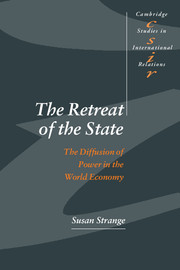Book contents
- Frontmatter
- Contents
- Preface
- Part I Theoretical foundations
- Part II Some empirical evidence
- 6 Authority beyond the state
- 7 Telecoms: the control of communication
- 8 Organised crime: the mafias
- 9 Insurance business: the risk managers
- 10 The Big Six accountants
- 11 Cartels and private protectionism
- 12 International organisations: the econocrats
- Part III Conclusions
- References
- Index
- CAMBRIDGE STUDIES IN INTERNATIONAL RELATIONS
10 - The Big Six accountants
from Part II - Some empirical evidence
Published online by Cambridge University Press: 07 October 2009
- Frontmatter
- Contents
- Preface
- Part I Theoretical foundations
- Part II Some empirical evidence
- 6 Authority beyond the state
- 7 Telecoms: the control of communication
- 8 Organised crime: the mafias
- 9 Insurance business: the risk managers
- 10 The Big Six accountants
- 11 Cartels and private protectionism
- 12 International organisations: the econocrats
- Part III Conclusions
- References
- Index
- CAMBRIDGE STUDIES IN INTERNATIONAL RELATIONS
Summary
The Big Six accountancy firms – Price Waterhouse, Peat Marwick McClintock, Coopers & Lybrand, Ernst and Young, Deloitte Touche Tohmatsu and Arthur Andersen – play an important and influential part in the world economy. How they came to do so, why they are all basically Anglo-American, what is the nature of their authority in the running of the world economy, and why states have allowed them such authority are all intriguing questions. They are also questions that need to be answered for any real understanding of the authority-market balance of power in the world system.
Few academics outside accountancy realise how big they are. Between them, they audit 96 of the top 100 British firms, and 494 of the Fortune 500. Their world-wide fee income, growing in some recent years by 25 per cent a year – totalled some $30 billion – about the same as Ireland's GDP. But it is not just as auditors that they are important. They have been instrumental in economic concentration as brokers in big merger and takeover deals involving international firms. As tax consultants, they have given these firms valuable advice on tax avoidance, thus limiting the authority of national governments to take a share of the wealth of big business. And they have become so much involved in corporate financing that they operate almost as banks, and certainly play a key part in the world's financial structure.
- Type
- Chapter
- Information
- The Retreat of the StateThe Diffusion of Power in the World Economy, pp. 135 - 146Publisher: Cambridge University PressPrint publication year: 1996

